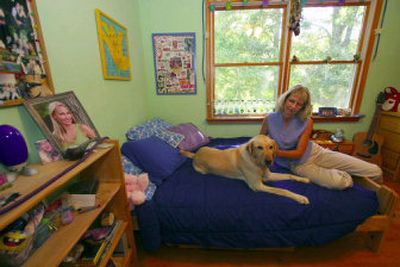Re-purposing the empty nest

WASHINGTON – In homes across the country, parents are eyeing bedrooms vacated by their newly minted college freshmen: Should they close the door and preserve them as a teen-age time capsule, or drag in a Stairmaster and set up a home gym?
“We could use a guest room,” says Skipp Calvert, an Alexandria, Va., landscape designer whose youngest son, David, departed for Southern Methodist University in Dallas last month. “But it sends the wrong message.”
Ha! says professional organizer and author Barbara Hemphill, who has five grown children. “Kids are supposed to find out how to live on their own. … Keeping their rooms forever isn’t always in their best interest.”
This fall, there are an estimated 1.2 million empty beds in the childhood homes of college freshmen who moved to campus housing. According to Student Monitor, a market research group, of the 1.8 million first-year students enrolled at the nation’s four-year colleges, about 67 percent live on campus. Some parents offer the coveted room-left-behind to a younger sibling, or set it up as a home office. But in many cases, they leave the basketball trophies and the CD towers intact, at least for a while, ready for when kids come home for vacations.
Dan Jones, director and chief psychologist at Appalachian State University in Boone, N.C., counsels parents as part of the university’s annual parent-orientation program. He says he is frequently asked if it’s OK to let a younger child move into a son or daughter’s room or to turn it into a computer room.
“The answer to all those questions is yes, but I recommend that they wait until after the first semester. The first semester the college student is adjusting to a major transition in their lives. Home is a haven for them. A lot of changes at home are probably not good.”
Jones often suggests waiting until Christmas break and discussing the change you want to make. “Just don’t surprise them. Give them time to get used to the idea. You dealt with the room the way it is all these years, you can wait four or five months.”
George Kuh, chancellor’s professor of higher education at Indiana University, says that between cell phones and e-mail, parents today have much more day-to-day communication with their college children than in decades past, when a weekly Sunday phone call was the norm.
“Students are much more connected to home psychologically than they were a generation or two ago. So the notion of doing something radical to the student’s room is almost blasphemous, if connections are remaining very strong.”
Adds Kuh, “I wouldn’t do much but get the carpet cleaned and look forward to welcoming the student back with their bedroom intact,” says Kuh. “It would be a rude awakening to come home and find a pool table in there.”
Mary and Skipp Calvert felt nostalgic when their youngest son, David, flew off to college, but not nostalgic enough to maintain his cluttered bedroom as a shrine. Within days, Mary Balfour Calvert was in there yanking out snarled computer cables and rearranging the crowded shelves of trophies, awards, framed photos and girlfriend gifts. She also cleaned the rug and washed David’s stuffed monkey, Foo Foo. She stopped short of doing anything drastic, such as turning her son’s hangout into a much-needed guest room — although space is at a premium in their narrow 1840 Alexandria townhouse.
“I was told that it’s very important not to change the room into another function, at least for the first year,” says Mary Calvert, a speech therapist. “It’s important to keep their sense of belonging.”
For Kristi Hoerauf of St. Leonard, Md., sending daughter Lauren off to Maryland’s Towson University brought no plans to change anything in the freshman’s green bedroom filled with childhood mementos and photographs. Kristi Hoerauf grew up in a military family that moved constantly. “I wondered what it would be like to have just one room and live in one home and have a place you really belonged. I wanted that for my children.” She and her husband, Robert, a dentist, wanted Lauren to be able to hang out in her room with friends from Patuxent High School during school vacations.
But some parents are not about to keep hands off crammed closets and taped-up Kiss posters.
“I had one client who turned her daughter’s bedroom into a meditation space,” says Lisa Bartolomei, a Washington designer and owner of Room Doctors. The client boxed her daughter’s belongings, stashed them in the attic and bought a new sofa bed. She painted the room pumpkin, and added crystals and candles. “Her daughter was having fun at college and she didn’t care,” says Bartolomei.
Professional organizer Hemphill, whose firm, Hemphill Productivity Institute, is based in North Carolina, says it is rude to dismantle a child’s room without communicating with them, but she urges parents to face the fact that their children are adults.
“Part of growing up and going to school is that children develop lives of their own,” says Hemphill.